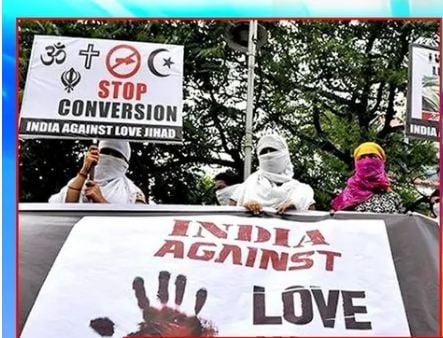Two petitions have been filed in the Supreme Court on Thursday challenging the constitutionality of the recently promulgated Uttar Pradesh Prohibition of Unlawful Conversion of Religion Ordinance 2020 and the Uttarakhand Freedom of Religion Act, 2018. The petitions claimed the laws made in the name of love jihad be declared null and void because it disturbed the basic structure of the Constitution.
The first petition filed by Advocate Neeraj Shukla said the law passed by the Uttar Pradesh government which recommended 1 to 5 years of jail, if any accused fails to prove the conversion of the woman was not for marriage, has resulted in the violation of Article 14, 15 , 21 and 25 of the Indian Constitution. Right to live with a person of his/her choice irrespective of religion is intrinsic to right to life and personal liberty. Interference in a personal relationship would constitute serious encroachment into the right to freedom of choice of the two individuals.
The petitioner has submitted that the true danger with this new so-called “love jihad” law lies not in its explicit textual basis, which seems fairly innocuous prima facie. Instead, its threat lies in its ambiguity. Although, the scope has been cleverly restricted within constitutional margins, the law employs the use of open–textured phrases such as undue influence, allurement and coercion.
The petitioner has thus asked for a direction in the nature of Mandamus to the State Government of Uttar Pradesh to declare the new law null and void and, instead, direct the Central Government to pass any legislation on religious conversion or enact a new law on Freedom of Religion and Conscience.
The other petition has been filed by advocates Vishal Thakre, Abhay Yadav and Pranvesh, a law researcher, seeking a direction to declare the ordinances of the two states to be ultra vires and direct authorities not to give effect to the ordinances passed by the governments concerned.
The petitioners have submitted that the ordinance passed by the State Governments of Uttar Pradesh and Uttrakhand is against the provisions of the Special Marriage Act, 1954. The law would create fear in the society who is not a part of love jihad as they can be falsely implicated in the ordinance. It was further submitted by the petitioner that this ordinance can become a potent tool in the hands of bad elements of the society to use this ordinance to falsely implicate anyone. There are also probabilities of falsely implicating persons who are not involved in any such acts and it would be a grave injustice if this ordinance is passed.



